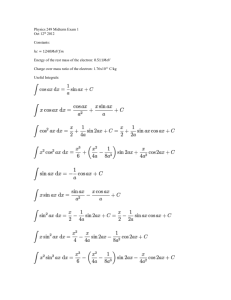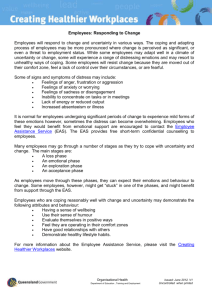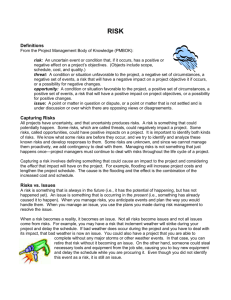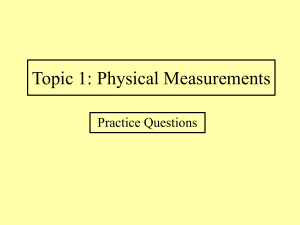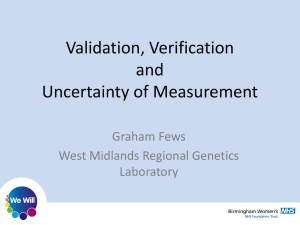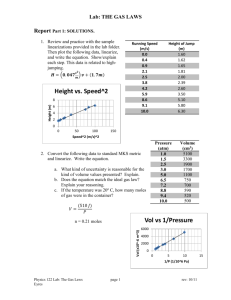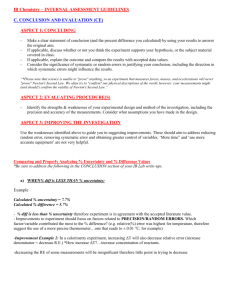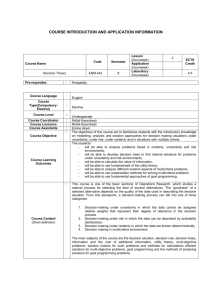Louise Buckle
advertisement
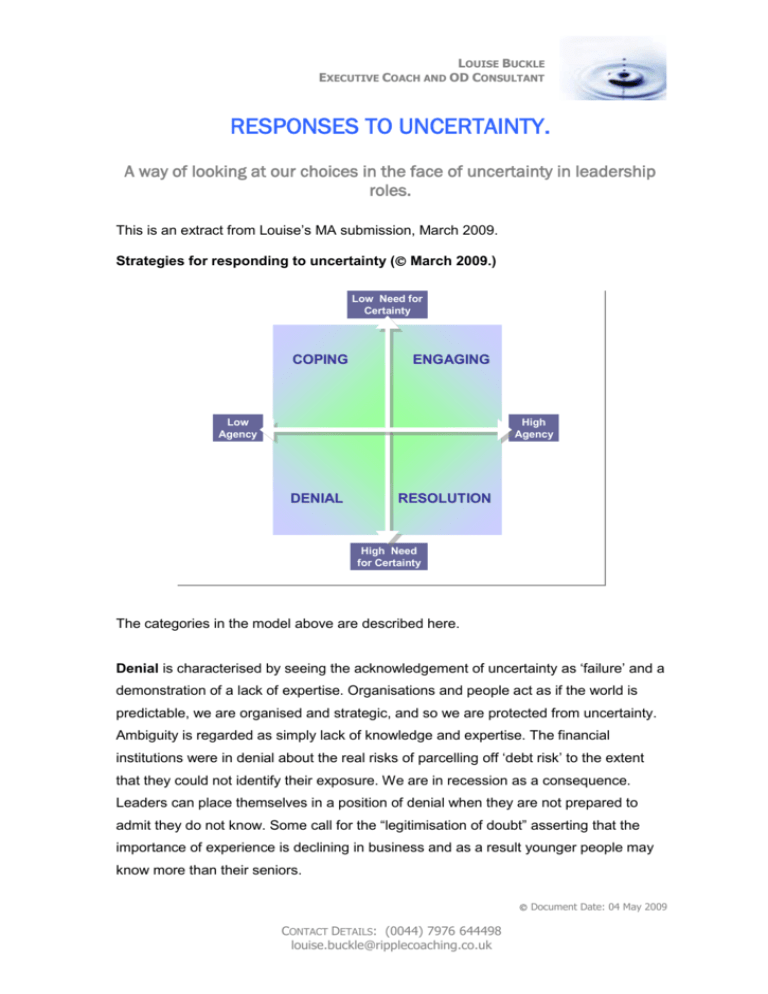
LOUISE BUCKLE EXECUTIVE COACH AND OD CONSULTANT RESPONSES TO UNCERTAINTY. A way of looking at our choices in the face of uncertainty in leadership roles. This is an extract from Louise’s MA submission, March 2009. Strategies for responding to uncertainty ( March 2009.) Low Need for Certainty COPING ENGAGING Low Agency High Agency DENIAL RESOLUTION High Need for Certainty The categories in the model above are described here. Denial is characterised by seeing the acknowledgement of uncertainty as ‘failure’ and a demonstration of a lack of expertise. Organisations and people act as if the world is predictable, we are organised and strategic, and so we are protected from uncertainty. Ambiguity is regarded as simply lack of knowledge and expertise. The financial institutions were in denial about the real risks of parcelling off ‘debt risk’ to the extent that they could not identify their exposure. We are in recession as a consequence. Leaders can place themselves in a position of denial when they are not prepared to admit they do not know. Some call for the “legitimisation of doubt” asserting that the importance of experience is declining in business and as a result younger people may know more than their seniors. Document Date: 04 May 2009 CONTACT DETAILS: (0044) 7976 644498 louise.buckle@ripplecoaching.co.uk LOUISE BUCKLE EXECUTIVE COACH AND OD CONSULTANT Coping is the strategy we use when we have a low sense of agency or empowerment in a situation. We recognise the uncertainty but don’t feel there is much we can do about it, so our strategy is to ‘cope’ and manage ‘through’ the uncertainty. Leaders will see their role as being to continue to deliver and to maintain the morale of staff. It is a place of waiting, hoping that time, external factors or senior leadership will resolve the uncertainty. It is not necessarily a negative place to be, it is a place of surviving but not thriving. My research suggests that current and ex public sector organisations may have a residual response to uncertainty that is a coping one. In these contexts the focus of the coaching agenda is very often the individual and their career needs and the interpersonal skills of effective team leadership (to maintain morale). Leaders are concerned with how I can get on in this context, rather than how I can change this context by changing my orientation to it. At a systemic level, in HR and among coaches, I would argue that this is not just arising from a place of respect for the individual, but from a culture of lack of agency to influence the wider system. Resolution is where we actively seek to create a new certainty. We plan our change and hope to move from the certainty of ‘A’ to the certainty of ‘B’. It is based on the idea that there must be an answer and the job of leaders is to find it, and to find it quickly, in order to remove the ambiguity. It reflects a low tolerance for ambiguity. This response appears to be more typical of engineering and technology based organisations. It is deeply ingrained in many of our management practices and problem solving / achievement orientation. It might provide a high achieving culture in a stable domain, but what happens when the context changes as it has for mobile telecoms staff? They are facing downturn for the first time after a heady period of growth. While an effective strategy for maintaining momentum, resolution can also represent a false sense of security. Where this is the dominant response, failure to achieve the desired resolution can lead to significant stress for the individual and the organisation. When resolution is achieved it heightens the sense of competence as in the Pharma company impact study where staff described ‘not wanting to stop’ using the behavioural improvement model. It unpacked the ‘mysteries’ of leadership behaviour for them, and, I would suggest, created a somewhat false sense of certainty. Engagement is, in my view, the most honest and helpful strategy for responding to uncertainty, though it may not be the easiest. It involves sitting with the discomfort; not just putting on a brave face, but accepting the lack of certainty and resolution and yet Document Date: 04 May 2009 CONTACT DETAILS: (0044) 7976 644498 louise.buckle@ripplecoaching.co.uk LOUISE BUCKLE EXECUTIVE COACH AND OD CONSULTANT still taking purposeful action in the world. It is this purposeful action, a sense of agency or confidence in the ability to make things happen, that distinguishes ‘engagement’ from ‘resolution’. The rush to action that according to Ket de Vries (2004) is, ‘a typical human response to anxiety’ and ‘a well-accepted response in the business world’ does not provide time for active engagement with the dilemmas, paradoxes and tensions that leaders and organisations face in order to create space for new creative possibilities to emerge. In this place of engagement with others we recognise our interdependence. We develop ‘trust’ in others that is not built on guarantees but on a sense of a shared world and shared journey. We learn to trust ourselves and find our own moral compass. We work together to build new organisational narratives that explain what is important to us without being too prescriptive about the future. What we achieve is greater flexibility, innovation and a higher tolerance for ambiguity in the individual and the organisation that will help us face the next big uncertainty. This is the source of breakthrough ideas. The model envisions the distinction between the humility and confidence to engage with uncertainty from the bravado and ‘I can do it all’ attitude that projects a false sense of confidence. This model proposes that the organisations that engage with the uncertainty and ambiguities organisational and business life will be the ones to survive and thrive. These are the ones that are being honest and direct about the difficulties they face, not the ones putting their heads in the sand and saying it won’t affect us (denial) talking themselves up and saying they have the answer (resolution) or just believing they will endure because they always have (coping). However, this should not be seen as a simple assessment model. It is worth noting that organisations and individuals may have any or all of these strategies in play in various situations or aspects of their lives at the same time. I suggest this model may be useful, not in assessing our response to uncertainty to date and labelling ourselves and our organisations, but in asking questions about where we are right now and facilitating dialogue about the choices and consequences available to us today and the conditions we need to create that will enable us to have a more flexible response in the future. Document Date: 04 May 2009 CONTACT DETAILS: (0044) 7976 644498 louise.buckle@ripplecoaching.co.uk
